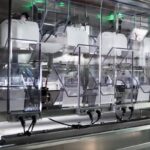The cannabis industry has experienced a technological revolution in recent years, with the integration of Industry 4.0 technologies throughout its value chain. Professionals in the manufacturing and processing sectors have witnessed firsthand the profound influence of artificial intelligence (AI), automation, computer vision, and machine learning (ML). It’s time we explore the space race of cannabis tech and examine how each of these technologies will impact the industry’s value chain today and in the years to come.
AI has emerged as a game-changer for the industry, offering enhanced productivity, improved decision-making, and increased efficiency. One significant application of AI is predictive analytics. By analyzing vast amounts of data, AI algorithms can predict trends, optimize cultivation processes, and ensure better inventory management.
Meanwhile, AI-powered chatbots and virtual assistants are revolutionizing customer service by providing personalized recommendations and guidance to consumers. AI even can help operators obtain licenses by providing all the necessary information in an easily accessible format.
With a fully trained model, an AI assistant can function as a cost-effective customer-support network. Does this mean we should fire all our employees and embrace our AI overlords? Not at all. It means we now have deeper access to information and can reinvest our human capital into areas where higher-level critical thinking is required.
Automation is reshaping the cannabis supply chain, optimizing workflows, and streamlining operations. From cultivation to packaging and distribution, automated systems are taking over labor-intensive tasks, improving consistency, and reducing costs.
Automated cultivation systems control environmental conditions such as light, temperature, and humidity to maximize crop yields. In manufacturing and packaging, robotic systems enable precise and efficient processes, ensuring product quality and reducing the risk of human error. Many packaging processes are deeply repetitive and mundane, which can leave operations vulnerable to human mistakes. By integrating robotics technology into these processes, companies can add a layer of quality control that remains consistent throughout the workday. For example, the act of placing jars into master cases sometimes can result in unit-count errors when human workers become bored or distracted, but this problem can be avoided entirely with technology such as robotics powering the process.
Computer vision has become a vital tool in quality control within the industry. With the ability to analyze plant health, assess maturity, and detect anomalies based on physical appearances, computer-vision systems can gauge the quality of products more accurately and efficiently than human inspectors. These systems utilize advanced cameras, image-recognition algorithms, and machine learning to monitor plants, detect pests and diseases, and ensure compliance with regulations. Implementing computer-vision technology helps producers maintain consistent product quality and minimize waste. This is an integral part of all Industry 4.0 manufacturing processes, providing the ability to create scalable quality-control solutions both within and outside the industry.
By training a computer-vision model on quality standards defined by a human inspector, we can multiply the judgment and heuristics used by a single person to benefit the entire industry. This creates a consistent grading scale for wholesale products and finished goods.
Machine learning is driving innovation in product development and research. ML algorithms can analyze large datasets to identify patterns, create predictive models, and even guide breeding programs.
By studying the genetic makeup of plant strains, ML can help identify desired traits, optimize cannabinoid profiles, and enhance products’ medicinal properties. ML also plays a crucial role in pharmaceutical research, aiding in the discovery of new cannabinoids and understanding their therapeutic potential. When used effectively, machine learning can transform a breakeven business into a highly profitable operation.
For example, if a grower were to feed their historical yields, flowering times, and spot market pricing into an optimization model, the model would be able to suggest the optimal strains to grow.
Large batches of information can be difficult to grasp, but an AI assistant paired with an ML model trained on a given dataset could tell cultivators exactly what to grow for the greatest return on investment in any given year provided any market condition. This is one of the most underutilized strategies for AI and ML in the industry’s value chain.
It’s evident the industry is undergoing a technological revolution and experiencing its own space race with an influx of Industry 4.0 technologies at the forefront. AI, automation, computer vision, and machine learning are revolutionizing cultivation practices, optimizing supply chains, improving quality control, and fueling innovation in product development. By embracing these advancements collectively versus trying to pick a fan favorite, the industry can enhance efficiency, ensure product quality, and meet growing consumer demands in an increasingly competitive market.
It’s imperative for industry professionals to understand the potential of these technologies and harness them to unlock new opportunities, propelling the industry into a future where science and technology converge to improve the business of cannabis, the industry surrounding it, and the community upon which it is built.













[…] secret that without the proper technology, manufacturing centers can be hazardous places. Luckily, technologies like automation, the internet of things (IoT), and artificial intelligence (AI) are adding a new layer of workplace […]